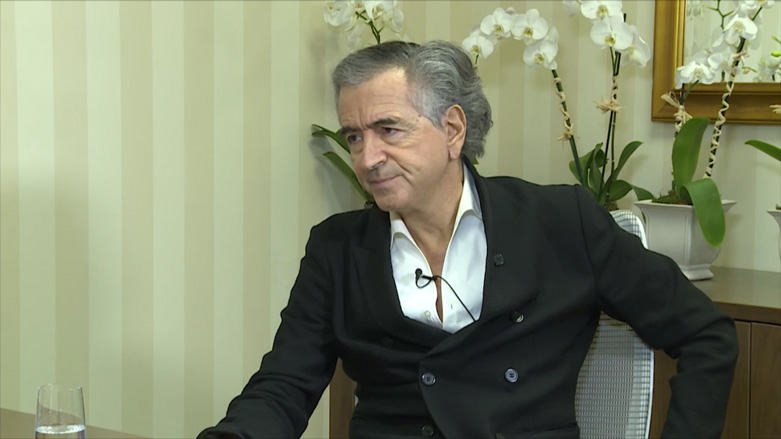Bernard-Henri Levy: Putin exploits US retreat; Fukuyama was wrong about history’s end
In Part I of this interview, the renowned French philosopher, author, and filmmaker Bernard-Henri Levy explained how the US betrayal of the Kurds in the fall of 2017, following the Kurdistan Region’s independence referendum, caused him to recognize a much bigger phenomenon: events in Kurdistan reflected a broader US abandonment of its role as the liberal standard-bearer in world affairs, a role it has played for the past 70 years.
WASHINGTON DC (Kurdistan 24) – “America is leaving the Middle East,” Bernard-Henri Levy lamented, and other parties, led by Russia, and including Syria, Hizbollah, and Iran, are moving to fill the vacuum.
Indeed, Russia is the “godfather of the coalition” of the illiberal group of allies. “In demographic, economic, and financial terms,” Russia is a “weak power,” which could be characterized, as Levy does in The Empire and the Five Kings, as “a zombie state.”
But America, today, is no longer upholding its “own creed and values,” and “Russia is taking advantage” of that “wherever it can,” Levy explained.
Some 30 years ago, following the collapse of the Soviet Union, American scholar Francis Fukuyama published a book, The End of History, which argued that Western liberal democracy, the social-political system of the US and Europe, had not only won the Cold War, but was the culmination of millennia of human existence. Nothing better was possible.
Whether Fukuyama captured a celebratory mood, made a persuasive argument, or something of both, the concept embodied in The End of History underlay US foreign policy for many years thereafter.
Asked if Fukuyama had been premature, Levy replied that Fukuyama was “a great thinker,” but “he was wrong.”
“Today’s situation, what happened in Kurdistan, and what I say in this book is the reply to Fukuyama, and the proof that he was wrong,” Levy affirmed.

“I would have loved Fukuyama to be right,” he continued, but liberal democracy “has not won all over the planet” and “history is not frozen.”
Indeed, since it was the collapse of the Soviet Union and communism that prompted Fukuyama to write The End of History, it is useful to note how US presidents long misread developments in Moscow, because in many respects, they shared Fukuyama’s perspective.
In June 2001, for example, after President George W. Bush’s first meeting with Russian President Vladimir Putin, Bush told reporters, "I looked the man in the eye. I found him very straightforward and trustworthy – I was able to get a sense of his soul.”
That Bush’s National Security Adviser, Condoleezza Rice, was an expert on Russia, only underscored the extent of the illusion.
Yet some experts in the State Department, even then, were arguing that Putin was a malign figure—the very opposite of what Bush had said, a State Department official revealed to Kurdistan 24. But Bush’s praise for the Russian leader “put the kibosh” on that debate.
Bush would learn better, as US relations with Russia would grow tense, despite his initial good will. Nonetheless, once Barack Obama became president, his Secretary of State, Hillary Clinton, ostentatiously sought to “reset” the relationship. Yet the Obama administration ended up with the same ties to Russia as its predecessor. Obama and Clinton had also misunderstood Moscow.
There is a “new world,” Levy fears, “directed more and more by illiberal, undemocratic leadership and values.”
The internet, including social media, may well be contributing to that. Levy emphasized that the internet has well-known, positive effects, including access for all to “the knowledge of the world,” while offering the possibility for “every citizen of the world” to express his opinions.
But there are bad effects, including “an attack on truth.” In the new digital world “fake news is king,” and “the difference between truth and not truth is less and less visible,” Levy explained, as he noted a “huge” rise in conspiracy theories (a point former CIA Director, Gen. Michael Hayden also made to Kurdistan 24.)
It is too easy to see a relationship between the internet and social media, on the one hand, and the rise of illiberal, populist leaders and movements, on the other.
Social media appeals to the emotions. It is relatively easy to gain support (and followers), if you can get people angry about some other group of people: immigrants, Muslims, Mexicans, Jews, whatever. You can, thus, build a movement, and, ultimately, perhaps, a political career.
Moreover, the intelligence agencies of some states, particularly Russia, are using social media covertly in an effort to manipulate public opinion, influence elections, and produce a friendlier international political climate.
Such are the issues addressed in The Empire and the Five Kings, as Bernard-Henri Levy reminds us of the inestimable value of the liberal order into which we were born and the dangers that await us, if we do not make the most vigorous effort to defend and preserve it.

